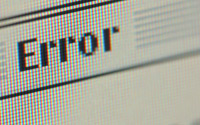News Analysis: News Media Keeps Getting It Wrong
- by Erik Sass @eriksass1, April 17, 2013
 It may be the pressure of the ever-shortening news cycle, the immediacy of digital publishing or the need to keep up with social media and news aggregators. But it seems
like journalists are making more mistakes nowadays, and not just anywhere: There are major errors of fact on high-profile cases; in other words, the last place a reporter wants to be wrong.
It may be the pressure of the ever-shortening news cycle, the immediacy of digital publishing or the need to keep up with social media and news aggregators. But it seems
like journalists are making more mistakes nowadays, and not just anywhere: There are major errors of fact on high-profile cases; in other words, the last place a reporter wants to be wrong.
Of course, everyone makes mistakes, and most journalists probably approach the topic of journalistic error with “there but for the grace of God” in the back of their minds.
It’s easy to criticize someone else’s performance, especially when they screw up during the journalistic equivalent of a high-wire act. But with all due journalistic humility, the fact
remains: News media just seems to keep getting stuff wrong -- important stuff, too.
The most recent error came in the wake of the Boston Marathon bombing on Wednesday, when multiple
news organizations -- including CNN, Fox News, The Boston Globe and the Associated Press -- reported that criminal investigators had arrested a suspect in the bombing.
advertisement
advertisement
The reports,
which were based on an unnamed source, turned out to be inaccurate. In fact, the FBI went so far as to release a statement asking the media, “to exercise caution and attempt to verify
information through appropriate official channels before reporting.”
Many readers and viewers were probably reminded of the immediate aftermath of the killings at Sandy Hook
Elementary School in Newtown, Connecticut, when reporters seemed to get everything wrong, including the name of the assailant, his occupation (or lack thereof), the type of guns used, how he gained
entry to the school, whether his mother worked there or not and the nature of his mental illness.
In retrospect, it seems like the number of mistakes dwarfed the number of reliable facts
reported in the first hours after the shooting. All anyone could really say with confidence was that something horrendous had happened.
Then there was CNN’s extremely
embarrassing misinterpretation of the Supreme Court’s ruling on Obamacare in June of last year. In all-caps font, the CNN Web site blared out the decisively wrong headline that the justices had
struck down the individual mandate, which is the centerpiece of the health care reform.
It’s not hard to see how it happened: CNN reporters and analysts probably jumped the gun after
reading, early in the ruling, that the majority had concluded that the mandate “is not a valid exercise of Congress’s power under the Commerce Clause and the Necessary and Proper
Clause.” However, the judgment went on to state the mandate was constitutional as a tax upon the uninsured, which meant that it was constitutional in the end.
So is there any
way to staunch the flow of journalistic mistakes?
The short, simple answer is “no, probably not” -- since the culture of the prize scoop and the shortened news cycle aren’t going away any time soon. But steps can be taken to mitigate and reduce the number of errors. Above all, journalists have to learn how to adapt to the new media environment by combining the imperative for speed with an equally urgent charge to get the facts right. Basically, journalists have to learn how to do everything better and faster.
A tall order, no doubt -- but that’s the
meaning of the profession we chose in today’s world. If we fail, we risk losing the public’s trust and attention.



Erik, you're right about the need to keep up with social media being one of the primary causes for the lack of verification in modern media. Too often journalists are citing Twitter as one of their sources for info.
Unfortunately everybody needs their news right now, and if your publication won't give them that they'll go somewhere else.
I think a good solution would be for media sources to get the W's out of the way (who,what,where,when) and save the why and how for a more researched follow up story.
P.S. Good job on keeping this story spelling and punctuation-error free.. that would have been quite ironic
In my opinion, part of the problem is that certain "journalists" are more interested in *being* the news than they are in *reporting* the news.
Really, how much would we lose if we the public had to wait another hour or more to make sure we had the correct information ? How much do we and would we lose getting the wrong information and believe the wrong facts leading to wrong opinions that can create unnecessary disasters and very costly errors ? An ounce of prevention is worth a pound of cure. Close your phones and pay attention to the people in your company.
If you report it first and wrong then you are not reporting...